Impact of Information Technology on Tourism Industry
VerifiedAdded on 2022/11/09
|13
|2564
|153
AI Summary
This report discusses the impact of information technology on the tourism industry, with a focus on the use of technology in Trip Advisor. It covers the need for IT in the industry, its role in business survival, implementation plans, and risks. It also discusses the pros and cons of IT in tourism and methods for monitoring and maintaining IT.
Contribute Materials
Your contribution can guide someone’s learning journey. Share your
documents today.
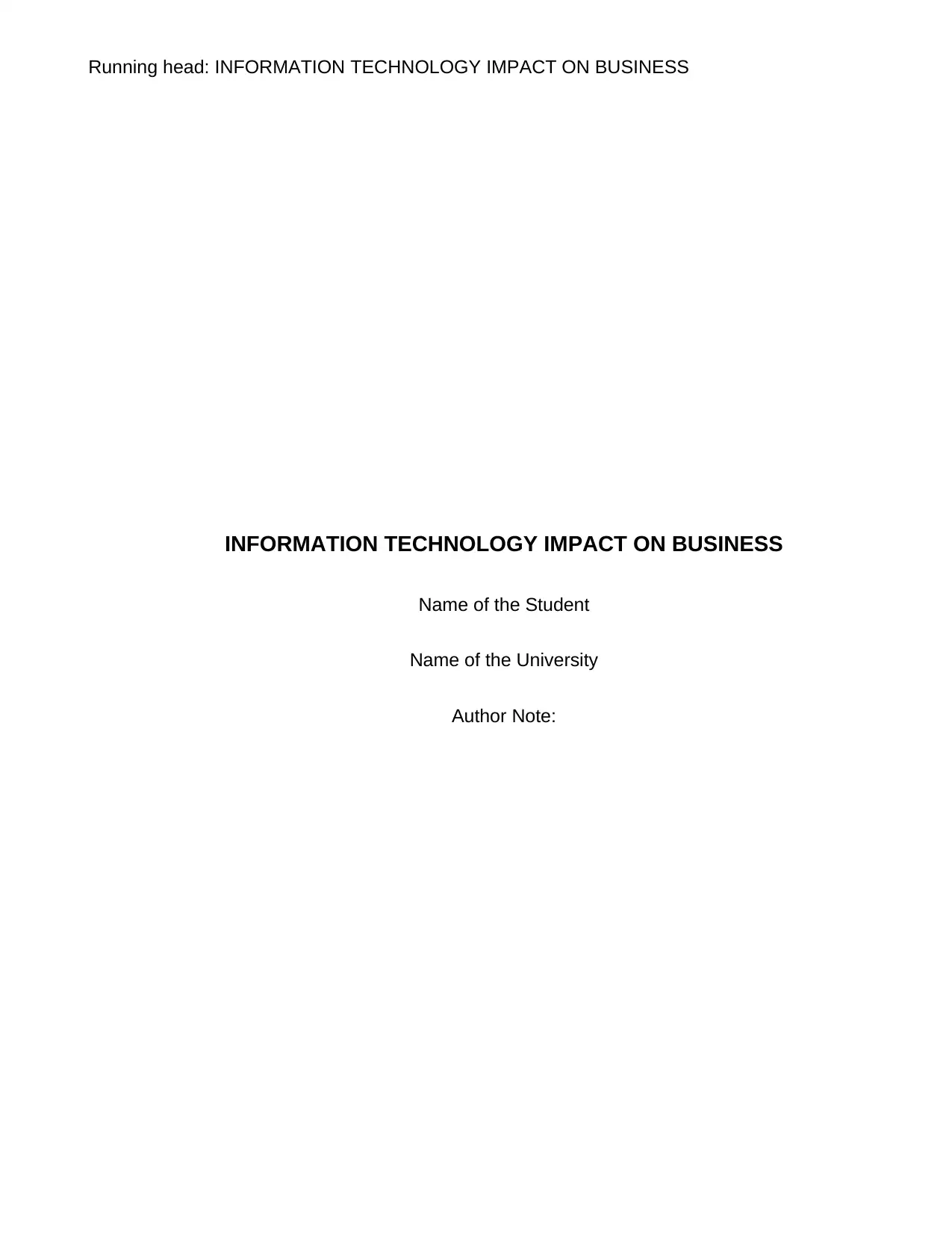
Running head: INFORMATION TECHNOLOGY IMPACT ON BUSINESS
INFORMATION TECHNOLOGY IMPACT ON BUSINESS
Name of the Student
Name of the University
Author Note:
INFORMATION TECHNOLOGY IMPACT ON BUSINESS
Name of the Student
Name of the University
Author Note:
Secure Best Marks with AI Grader
Need help grading? Try our AI Grader for instant feedback on your assignments.
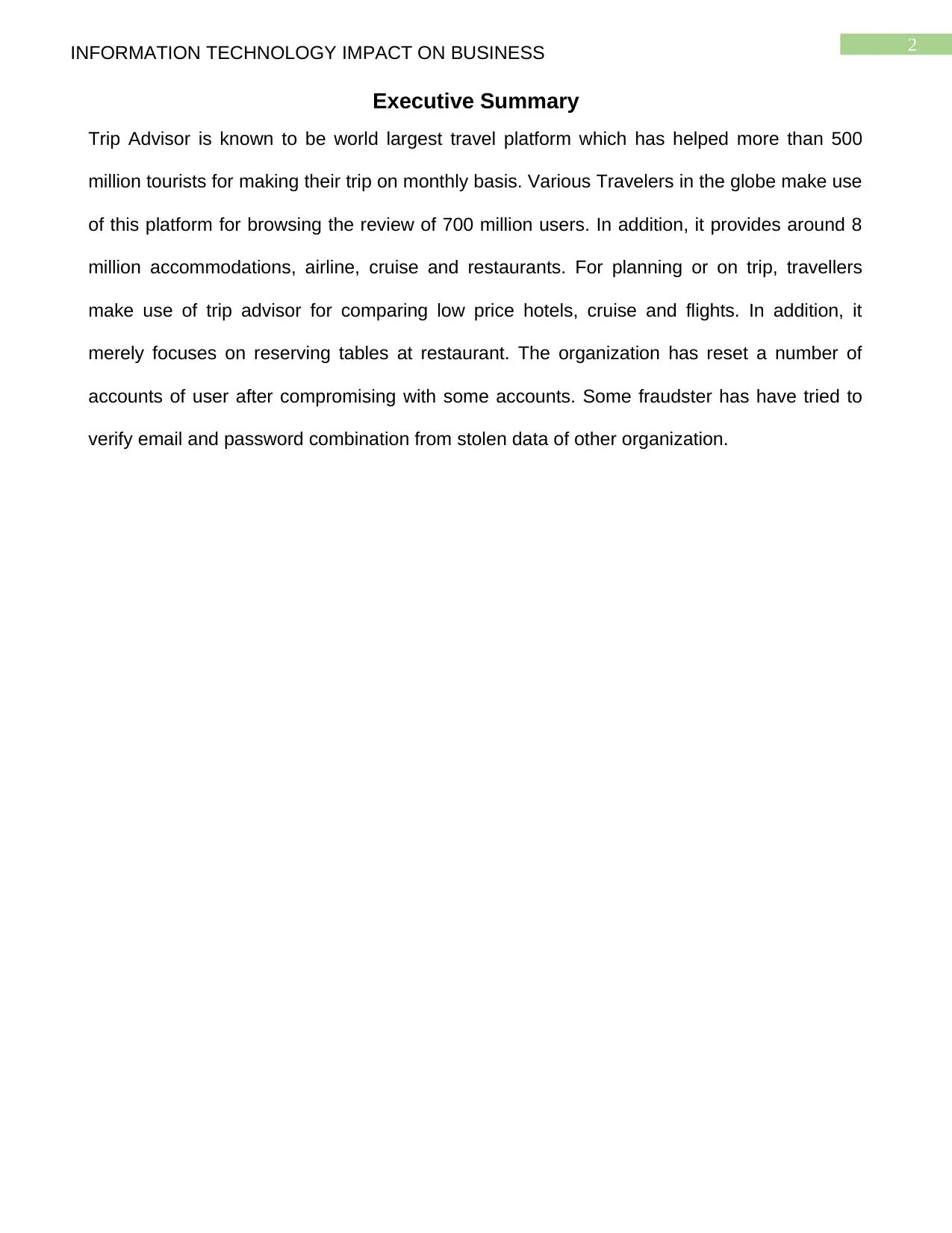
2INFORMATION TECHNOLOGY IMPACT ON BUSINESS
Executive Summary
Trip Advisor is known to be world largest travel platform which has helped more than 500
million tourists for making their trip on monthly basis. Various Travelers in the globe make use
of this platform for browsing the review of 700 million users. In addition, it provides around 8
million accommodations, airline, cruise and restaurants. For planning or on trip, travellers
make use of trip advisor for comparing low price hotels, cruise and flights. In addition, it
merely focuses on reserving tables at restaurant. The organization has reset a number of
accounts of user after compromising with some accounts. Some fraudster has have tried to
verify email and password combination from stolen data of other organization.
Executive Summary
Trip Advisor is known to be world largest travel platform which has helped more than 500
million tourists for making their trip on monthly basis. Various Travelers in the globe make use
of this platform for browsing the review of 700 million users. In addition, it provides around 8
million accommodations, airline, cruise and restaurants. For planning or on trip, travellers
make use of trip advisor for comparing low price hotels, cruise and flights. In addition, it
merely focuses on reserving tables at restaurant. The organization has reset a number of
accounts of user after compromising with some accounts. Some fraudster has have tried to
verify email and password combination from stolen data of other organization.
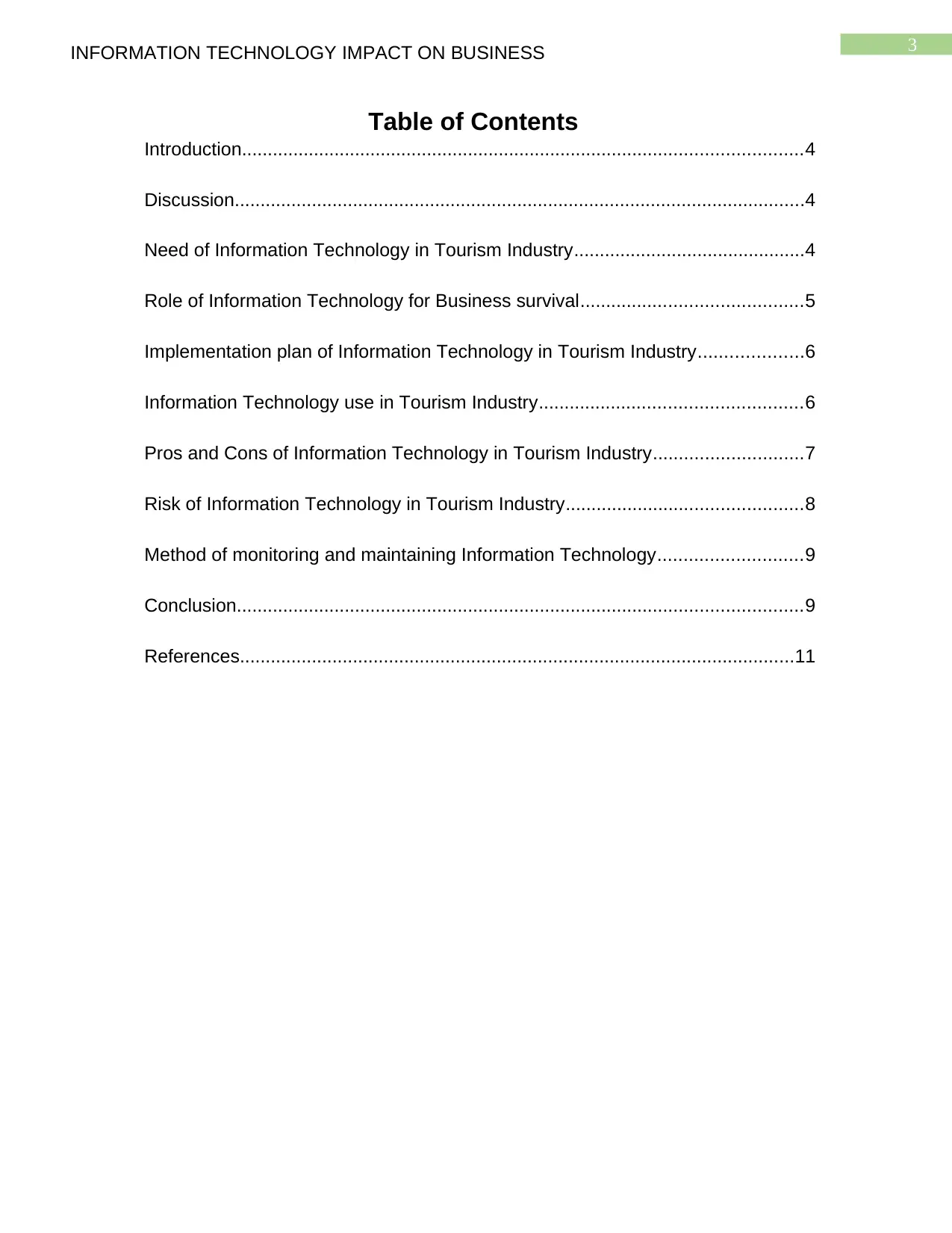
3INFORMATION TECHNOLOGY IMPACT ON BUSINESS
Table of Contents
Introduction.............................................................................................................4
Discussion...............................................................................................................4
Need of Information Technology in Tourism Industry.............................................4
Role of Information Technology for Business survival...........................................5
Implementation plan of Information Technology in Tourism Industry....................6
Information Technology use in Tourism Industry...................................................6
Pros and Cons of Information Technology in Tourism Industry.............................7
Risk of Information Technology in Tourism Industry..............................................8
Method of monitoring and maintaining Information Technology............................9
Conclusion..............................................................................................................9
References............................................................................................................11
Table of Contents
Introduction.............................................................................................................4
Discussion...............................................................................................................4
Need of Information Technology in Tourism Industry.............................................4
Role of Information Technology for Business survival...........................................5
Implementation plan of Information Technology in Tourism Industry....................6
Information Technology use in Tourism Industry...................................................6
Pros and Cons of Information Technology in Tourism Industry.............................7
Risk of Information Technology in Tourism Industry..............................................8
Method of monitoring and maintaining Information Technology............................9
Conclusion..............................................................................................................9
References............................................................................................................11
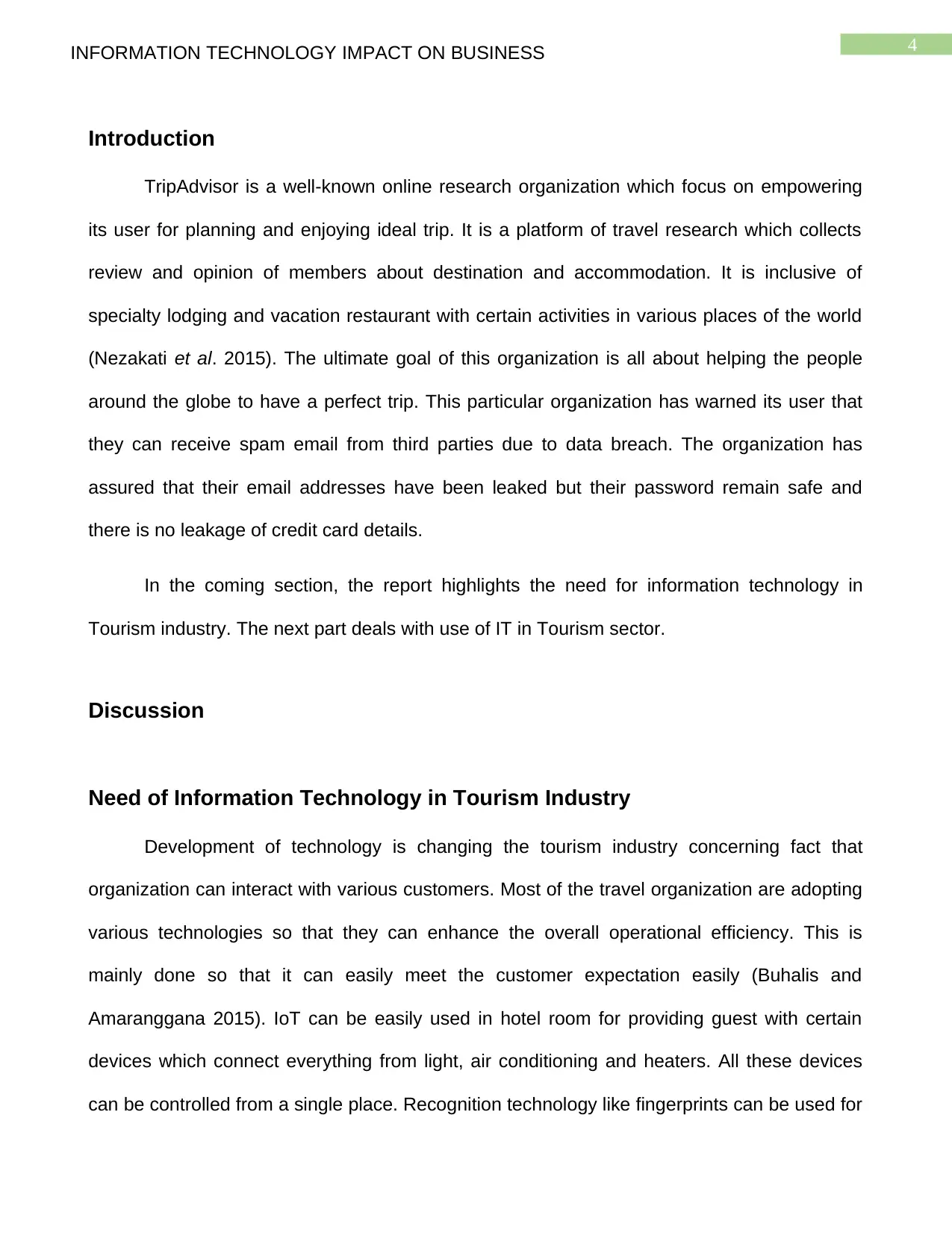
4INFORMATION TECHNOLOGY IMPACT ON BUSINESS
Introduction
TripAdvisor is a well-known online research organization which focus on empowering
its user for planning and enjoying ideal trip. It is a platform of travel research which collects
review and opinion of members about destination and accommodation. It is inclusive of
specialty lodging and vacation restaurant with certain activities in various places of the world
(Nezakati et al. 2015). The ultimate goal of this organization is all about helping the people
around the globe to have a perfect trip. This particular organization has warned its user that
they can receive spam email from third parties due to data breach. The organization has
assured that their email addresses have been leaked but their password remain safe and
there is no leakage of credit card details.
In the coming section, the report highlights the need for information technology in
Tourism industry. The next part deals with use of IT in Tourism sector.
Discussion
Need of Information Technology in Tourism Industry
Development of technology is changing the tourism industry concerning fact that
organization can interact with various customers. Most of the travel organization are adopting
various technologies so that they can enhance the overall operational efficiency. This is
mainly done so that it can easily meet the customer expectation easily (Buhalis and
Amaranggana 2015). IoT can be easily used in hotel room for providing guest with certain
devices which connect everything from light, air conditioning and heaters. All these devices
can be controlled from a single place. Recognition technology like fingerprints can be used for
Introduction
TripAdvisor is a well-known online research organization which focus on empowering
its user for planning and enjoying ideal trip. It is a platform of travel research which collects
review and opinion of members about destination and accommodation. It is inclusive of
specialty lodging and vacation restaurant with certain activities in various places of the world
(Nezakati et al. 2015). The ultimate goal of this organization is all about helping the people
around the globe to have a perfect trip. This particular organization has warned its user that
they can receive spam email from third parties due to data breach. The organization has
assured that their email addresses have been leaked but their password remain safe and
there is no leakage of credit card details.
In the coming section, the report highlights the need for information technology in
Tourism industry. The next part deals with use of IT in Tourism sector.
Discussion
Need of Information Technology in Tourism Industry
Development of technology is changing the tourism industry concerning fact that
organization can interact with various customers. Most of the travel organization are adopting
various technologies so that they can enhance the overall operational efficiency. This is
mainly done so that it can easily meet the customer expectation easily (Buhalis and
Amaranggana 2015). IoT can be easily used in hotel room for providing guest with certain
devices which connect everything from light, air conditioning and heaters. All these devices
can be controlled from a single place. Recognition technology like fingerprints can be used for
Secure Best Marks with AI Grader
Need help grading? Try our AI Grader for instant feedback on your assignments.
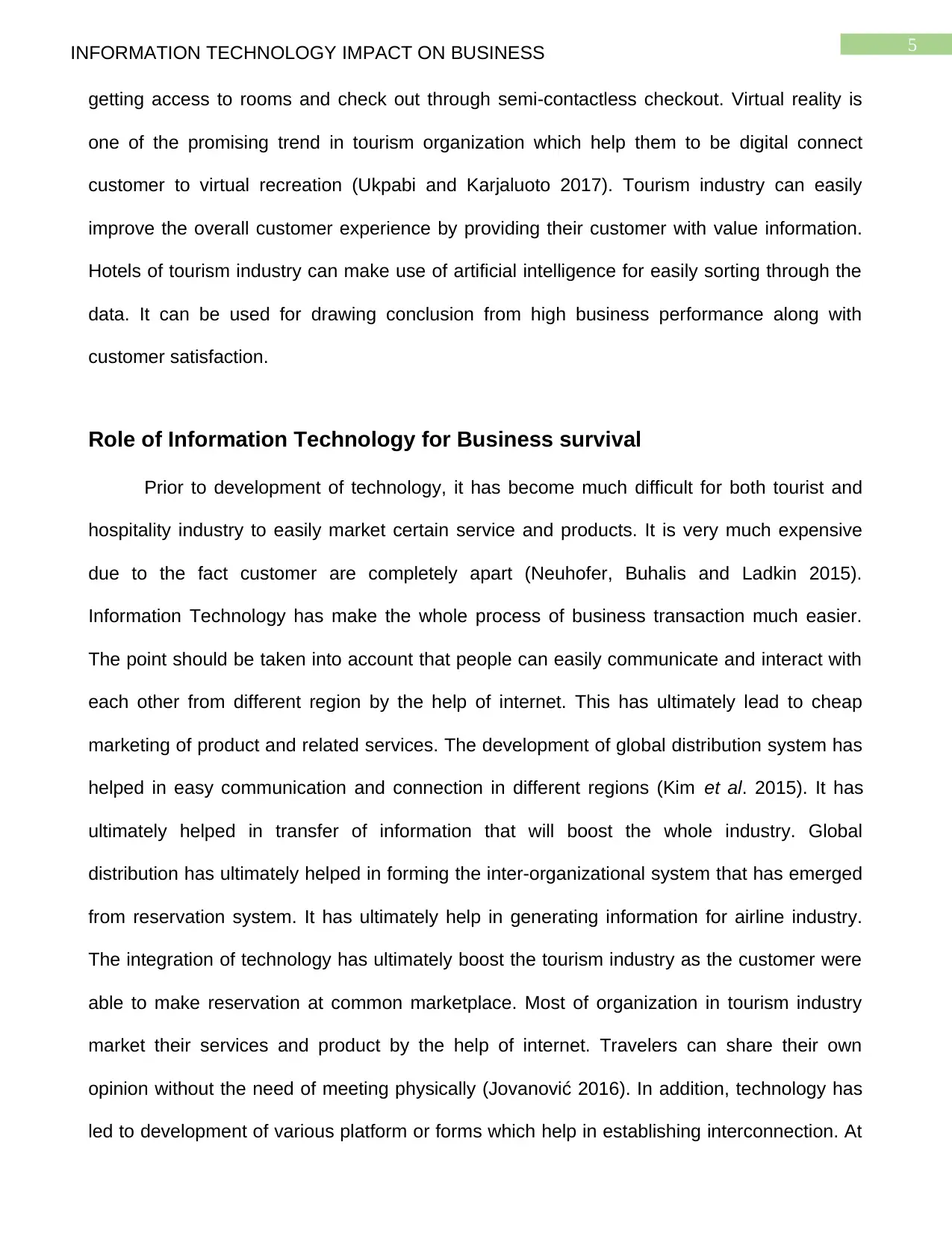
5INFORMATION TECHNOLOGY IMPACT ON BUSINESS
getting access to rooms and check out through semi-contactless checkout. Virtual reality is
one of the promising trend in tourism organization which help them to be digital connect
customer to virtual recreation (Ukpabi and Karjaluoto 2017). Tourism industry can easily
improve the overall customer experience by providing their customer with value information.
Hotels of tourism industry can make use of artificial intelligence for easily sorting through the
data. It can be used for drawing conclusion from high business performance along with
customer satisfaction.
Role of Information Technology for Business survival
Prior to development of technology, it has become much difficult for both tourist and
hospitality industry to easily market certain service and products. It is very much expensive
due to the fact customer are completely apart (Neuhofer, Buhalis and Ladkin 2015).
Information Technology has make the whole process of business transaction much easier.
The point should be taken into account that people can easily communicate and interact with
each other from different region by the help of internet. This has ultimately lead to cheap
marketing of product and related services. The development of global distribution system has
helped in easy communication and connection in different regions (Kim et al. 2015). It has
ultimately helped in transfer of information that will boost the whole industry. Global
distribution has ultimately helped in forming the inter-organizational system that has emerged
from reservation system. It has ultimately help in generating information for airline industry.
The integration of technology has ultimately boost the tourism industry as the customer were
able to make reservation at common marketplace. Most of organization in tourism industry
market their services and product by the help of internet. Travelers can share their own
opinion without the need of meeting physically (Jovanović 2016). In addition, technology has
led to development of various platform or forms which help in establishing interconnection. At
getting access to rooms and check out through semi-contactless checkout. Virtual reality is
one of the promising trend in tourism organization which help them to be digital connect
customer to virtual recreation (Ukpabi and Karjaluoto 2017). Tourism industry can easily
improve the overall customer experience by providing their customer with value information.
Hotels of tourism industry can make use of artificial intelligence for easily sorting through the
data. It can be used for drawing conclusion from high business performance along with
customer satisfaction.
Role of Information Technology for Business survival
Prior to development of technology, it has become much difficult for both tourist and
hospitality industry to easily market certain service and products. It is very much expensive
due to the fact customer are completely apart (Neuhofer, Buhalis and Ladkin 2015).
Information Technology has make the whole process of business transaction much easier.
The point should be taken into account that people can easily communicate and interact with
each other from different region by the help of internet. This has ultimately lead to cheap
marketing of product and related services. The development of global distribution system has
helped in easy communication and connection in different regions (Kim et al. 2015). It has
ultimately helped in transfer of information that will boost the whole industry. Global
distribution has ultimately helped in forming the inter-organizational system that has emerged
from reservation system. It has ultimately help in generating information for airline industry.
The integration of technology has ultimately boost the tourism industry as the customer were
able to make reservation at common marketplace. Most of organization in tourism industry
market their services and product by the help of internet. Travelers can share their own
opinion without the need of meeting physically (Jovanović 2016). In addition, technology has
led to development of various platform or forms which help in establishing interconnection. At
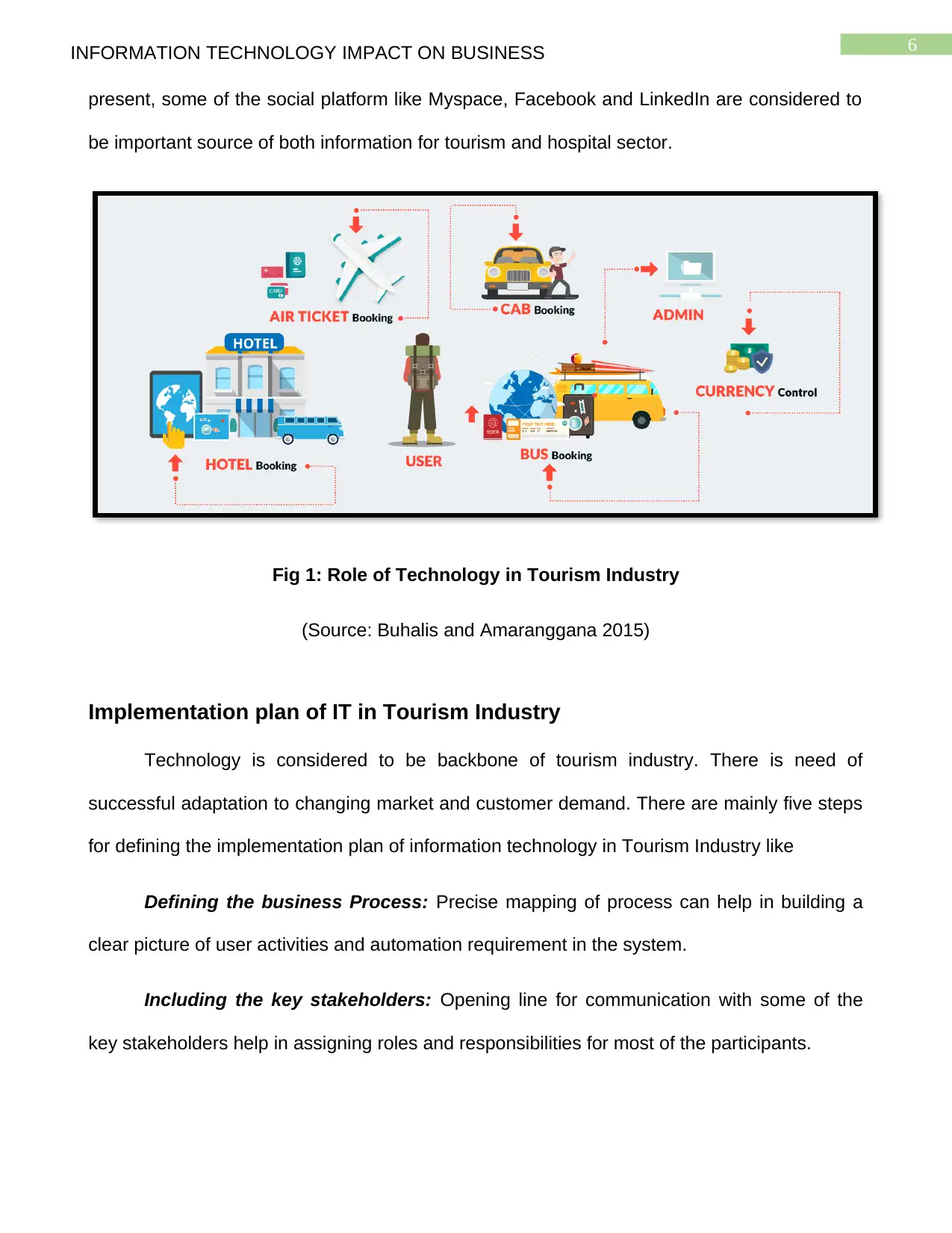
6INFORMATION TECHNOLOGY IMPACT ON BUSINESS
present, some of the social platform like Myspace, Facebook and LinkedIn are considered to
be important source of both information for tourism and hospital sector.
Fig 1: Role of Technology in Tourism Industry
(Source: Buhalis and Amaranggana 2015)
Implementation plan of IT in Tourism Industry
Technology is considered to be backbone of tourism industry. There is need of
successful adaptation to changing market and customer demand. There are mainly five steps
for defining the implementation plan of information technology in Tourism Industry like
Defining the business Process: Precise mapping of process can help in building a
clear picture of user activities and automation requirement in the system.
Including the key stakeholders: Opening line for communication with some of the
key stakeholders help in assigning roles and responsibilities for most of the participants.
present, some of the social platform like Myspace, Facebook and LinkedIn are considered to
be important source of both information for tourism and hospital sector.
Fig 1: Role of Technology in Tourism Industry
(Source: Buhalis and Amaranggana 2015)
Implementation plan of IT in Tourism Industry
Technology is considered to be backbone of tourism industry. There is need of
successful adaptation to changing market and customer demand. There are mainly five steps
for defining the implementation plan of information technology in Tourism Industry like
Defining the business Process: Precise mapping of process can help in building a
clear picture of user activities and automation requirement in the system.
Including the key stakeholders: Opening line for communication with some of the
key stakeholders help in assigning roles and responsibilities for most of the participants.
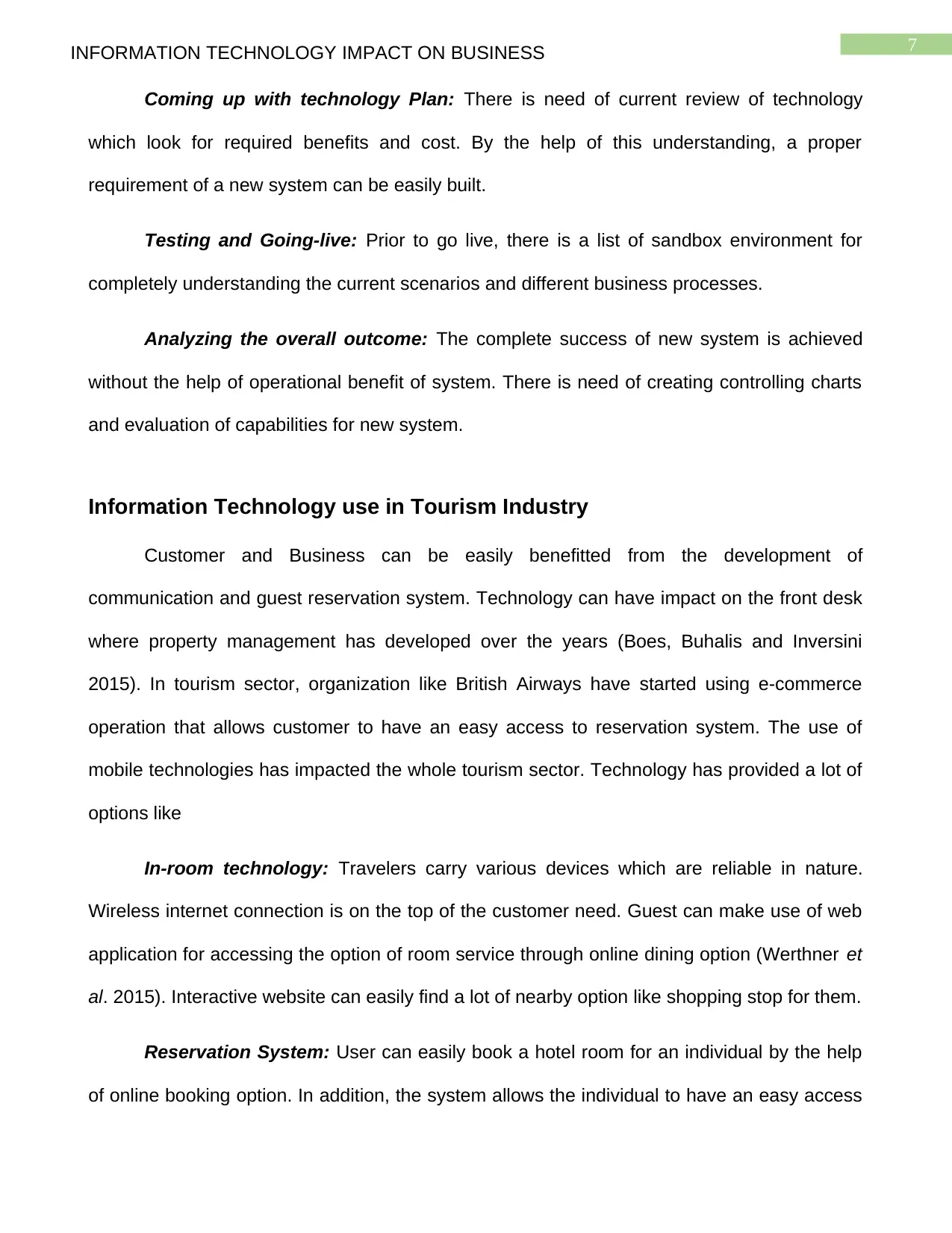
7INFORMATION TECHNOLOGY IMPACT ON BUSINESS
Coming up with technology Plan: There is need of current review of technology
which look for required benefits and cost. By the help of this understanding, a proper
requirement of a new system can be easily built.
Testing and Going-live: Prior to go live, there is a list of sandbox environment for
completely understanding the current scenarios and different business processes.
Analyzing the overall outcome: The complete success of new system is achieved
without the help of operational benefit of system. There is need of creating controlling charts
and evaluation of capabilities for new system.
Information Technology use in Tourism Industry
Customer and Business can be easily benefitted from the development of
communication and guest reservation system. Technology can have impact on the front desk
where property management has developed over the years (Boes, Buhalis and Inversini
2015). In tourism sector, organization like British Airways have started using e-commerce
operation that allows customer to have an easy access to reservation system. The use of
mobile technologies has impacted the whole tourism sector. Technology has provided a lot of
options like
In-room technology: Travelers carry various devices which are reliable in nature.
Wireless internet connection is on the top of the customer need. Guest can make use of web
application for accessing the option of room service through online dining option (Werthner et
al. 2015). Interactive website can easily find a lot of nearby option like shopping stop for them.
Reservation System: User can easily book a hotel room for an individual by the help
of online booking option. In addition, the system allows the individual to have an easy access
Coming up with technology Plan: There is need of current review of technology
which look for required benefits and cost. By the help of this understanding, a proper
requirement of a new system can be easily built.
Testing and Going-live: Prior to go live, there is a list of sandbox environment for
completely understanding the current scenarios and different business processes.
Analyzing the overall outcome: The complete success of new system is achieved
without the help of operational benefit of system. There is need of creating controlling charts
and evaluation of capabilities for new system.
Information Technology use in Tourism Industry
Customer and Business can be easily benefitted from the development of
communication and guest reservation system. Technology can have impact on the front desk
where property management has developed over the years (Boes, Buhalis and Inversini
2015). In tourism sector, organization like British Airways have started using e-commerce
operation that allows customer to have an easy access to reservation system. The use of
mobile technologies has impacted the whole tourism sector. Technology has provided a lot of
options like
In-room technology: Travelers carry various devices which are reliable in nature.
Wireless internet connection is on the top of the customer need. Guest can make use of web
application for accessing the option of room service through online dining option (Werthner et
al. 2015). Interactive website can easily find a lot of nearby option like shopping stop for them.
Reservation System: User can easily book a hotel room for an individual by the help
of online booking option. In addition, the system allows the individual to have an easy access
Paraphrase This Document
Need a fresh take? Get an instant paraphrase of this document with our AI Paraphraser
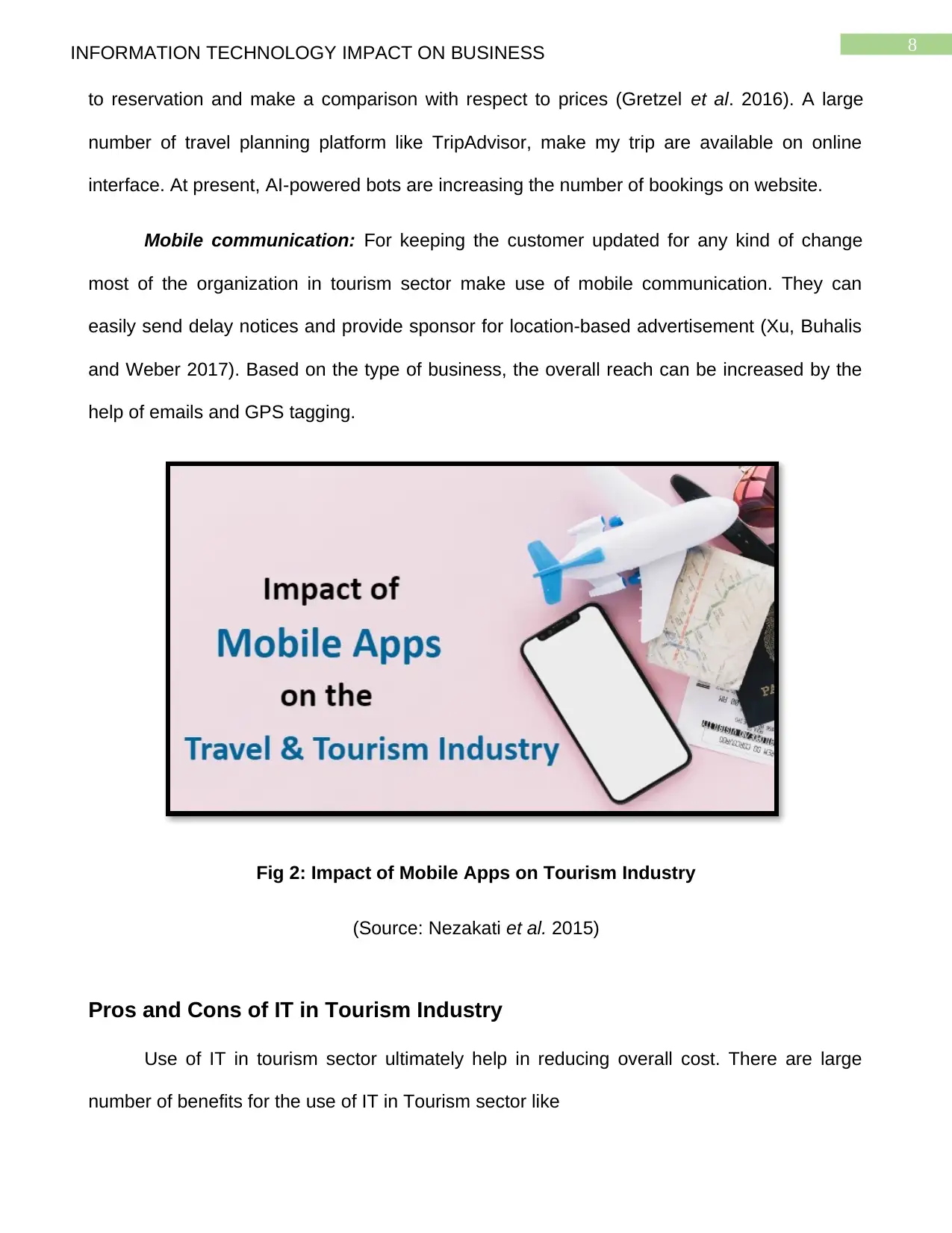
8INFORMATION TECHNOLOGY IMPACT ON BUSINESS
to reservation and make a comparison with respect to prices (Gretzel et al. 2016). A large
number of travel planning platform like TripAdvisor, make my trip are available on online
interface. At present, AI-powered bots are increasing the number of bookings on website.
Mobile communication: For keeping the customer updated for any kind of change
most of the organization in tourism sector make use of mobile communication. They can
easily send delay notices and provide sponsor for location-based advertisement (Xu, Buhalis
and Weber 2017). Based on the type of business, the overall reach can be increased by the
help of emails and GPS tagging.
Fig 2: Impact of Mobile Apps on Tourism Industry
(Source: Nezakati et al. 2015)
Pros and Cons of IT in Tourism Industry
Use of IT in tourism sector ultimately help in reducing overall cost. There are large
number of benefits for the use of IT in Tourism sector like
to reservation and make a comparison with respect to prices (Gretzel et al. 2016). A large
number of travel planning platform like TripAdvisor, make my trip are available on online
interface. At present, AI-powered bots are increasing the number of bookings on website.
Mobile communication: For keeping the customer updated for any kind of change
most of the organization in tourism sector make use of mobile communication. They can
easily send delay notices and provide sponsor for location-based advertisement (Xu, Buhalis
and Weber 2017). Based on the type of business, the overall reach can be increased by the
help of emails and GPS tagging.
Fig 2: Impact of Mobile Apps on Tourism Industry
(Source: Nezakati et al. 2015)
Pros and Cons of IT in Tourism Industry
Use of IT in tourism sector ultimately help in reducing overall cost. There are large
number of benefits for the use of IT in Tourism sector like
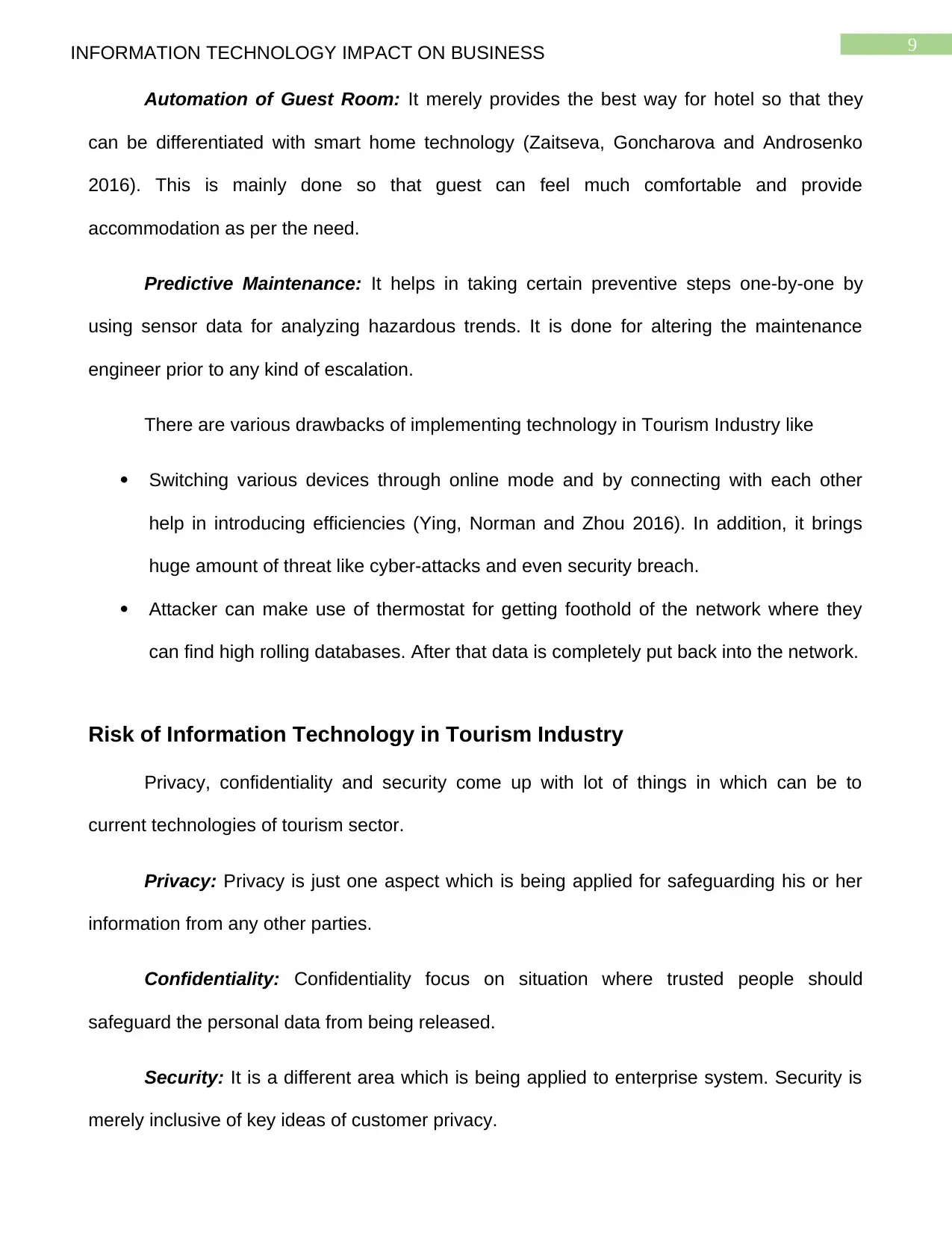
9INFORMATION TECHNOLOGY IMPACT ON BUSINESS
Automation of Guest Room: It merely provides the best way for hotel so that they
can be differentiated with smart home technology (Zaitseva, Goncharova and Androsenko
2016). This is mainly done so that guest can feel much comfortable and provide
accommodation as per the need.
Predictive Maintenance: It helps in taking certain preventive steps one-by-one by
using sensor data for analyzing hazardous trends. It is done for altering the maintenance
engineer prior to any kind of escalation.
There are various drawbacks of implementing technology in Tourism Industry like
Switching various devices through online mode and by connecting with each other
help in introducing efficiencies (Ying, Norman and Zhou 2016). In addition, it brings
huge amount of threat like cyber-attacks and even security breach.
Attacker can make use of thermostat for getting foothold of the network where they
can find high rolling databases. After that data is completely put back into the network.
Risk of Information Technology in Tourism Industry
Privacy, confidentiality and security come up with lot of things in which can be to
current technologies of tourism sector.
Privacy: Privacy is just one aspect which is being applied for safeguarding his or her
information from any other parties.
Confidentiality: Confidentiality focus on situation where trusted people should
safeguard the personal data from being released.
Security: It is a different area which is being applied to enterprise system. Security is
merely inclusive of key ideas of customer privacy.
Automation of Guest Room: It merely provides the best way for hotel so that they
can be differentiated with smart home technology (Zaitseva, Goncharova and Androsenko
2016). This is mainly done so that guest can feel much comfortable and provide
accommodation as per the need.
Predictive Maintenance: It helps in taking certain preventive steps one-by-one by
using sensor data for analyzing hazardous trends. It is done for altering the maintenance
engineer prior to any kind of escalation.
There are various drawbacks of implementing technology in Tourism Industry like
Switching various devices through online mode and by connecting with each other
help in introducing efficiencies (Ying, Norman and Zhou 2016). In addition, it brings
huge amount of threat like cyber-attacks and even security breach.
Attacker can make use of thermostat for getting foothold of the network where they
can find high rolling databases. After that data is completely put back into the network.
Risk of Information Technology in Tourism Industry
Privacy, confidentiality and security come up with lot of things in which can be to
current technologies of tourism sector.
Privacy: Privacy is just one aspect which is being applied for safeguarding his or her
information from any other parties.
Confidentiality: Confidentiality focus on situation where trusted people should
safeguard the personal data from being released.
Security: It is a different area which is being applied to enterprise system. Security is
merely inclusive of key ideas of customer privacy.
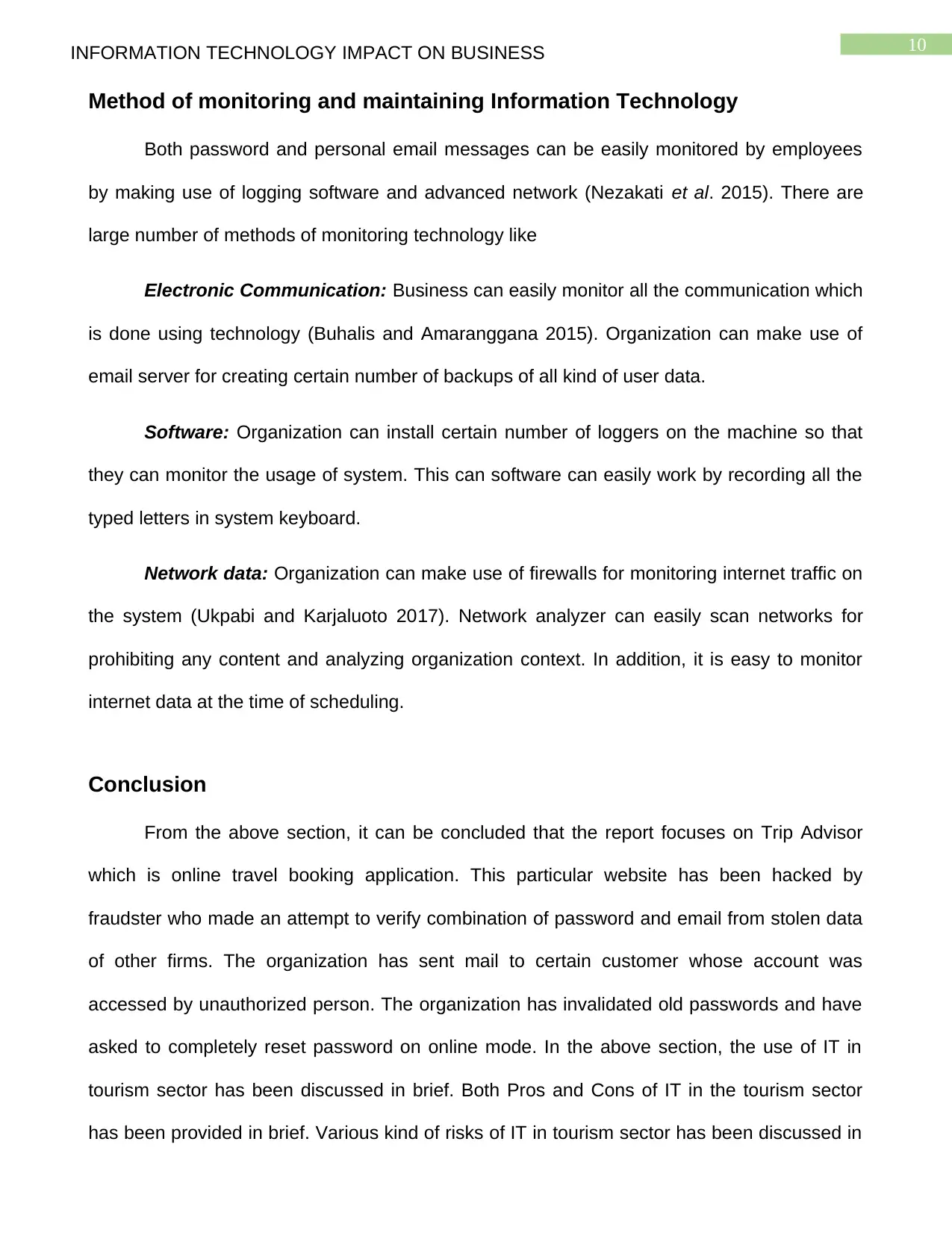
10INFORMATION TECHNOLOGY IMPACT ON BUSINESS
Method of monitoring and maintaining Information Technology
Both password and personal email messages can be easily monitored by employees
by making use of logging software and advanced network (Nezakati et al. 2015). There are
large number of methods of monitoring technology like
Electronic Communication: Business can easily monitor all the communication which
is done using technology (Buhalis and Amaranggana 2015). Organization can make use of
email server for creating certain number of backups of all kind of user data.
Software: Organization can install certain number of loggers on the machine so that
they can monitor the usage of system. This can software can easily work by recording all the
typed letters in system keyboard.
Network data: Organization can make use of firewalls for monitoring internet traffic on
the system (Ukpabi and Karjaluoto 2017). Network analyzer can easily scan networks for
prohibiting any content and analyzing organization context. In addition, it is easy to monitor
internet data at the time of scheduling.
Conclusion
From the above section, it can be concluded that the report focuses on Trip Advisor
which is online travel booking application. This particular website has been hacked by
fraudster who made an attempt to verify combination of password and email from stolen data
of other firms. The organization has sent mail to certain customer whose account was
accessed by unauthorized person. The organization has invalidated old passwords and have
asked to completely reset password on online mode. In the above section, the use of IT in
tourism sector has been discussed in brief. Both Pros and Cons of IT in the tourism sector
has been provided in brief. Various kind of risks of IT in tourism sector has been discussed in
Method of monitoring and maintaining Information Technology
Both password and personal email messages can be easily monitored by employees
by making use of logging software and advanced network (Nezakati et al. 2015). There are
large number of methods of monitoring technology like
Electronic Communication: Business can easily monitor all the communication which
is done using technology (Buhalis and Amaranggana 2015). Organization can make use of
email server for creating certain number of backups of all kind of user data.
Software: Organization can install certain number of loggers on the machine so that
they can monitor the usage of system. This can software can easily work by recording all the
typed letters in system keyboard.
Network data: Organization can make use of firewalls for monitoring internet traffic on
the system (Ukpabi and Karjaluoto 2017). Network analyzer can easily scan networks for
prohibiting any content and analyzing organization context. In addition, it is easy to monitor
internet data at the time of scheduling.
Conclusion
From the above section, it can be concluded that the report focuses on Trip Advisor
which is online travel booking application. This particular website has been hacked by
fraudster who made an attempt to verify combination of password and email from stolen data
of other firms. The organization has sent mail to certain customer whose account was
accessed by unauthorized person. The organization has invalidated old passwords and have
asked to completely reset password on online mode. In the above section, the use of IT in
tourism sector has been discussed in brief. Both Pros and Cons of IT in the tourism sector
has been provided in brief. Various kind of risks of IT in tourism sector has been discussed in
Secure Best Marks with AI Grader
Need help grading? Try our AI Grader for instant feedback on your assignments.
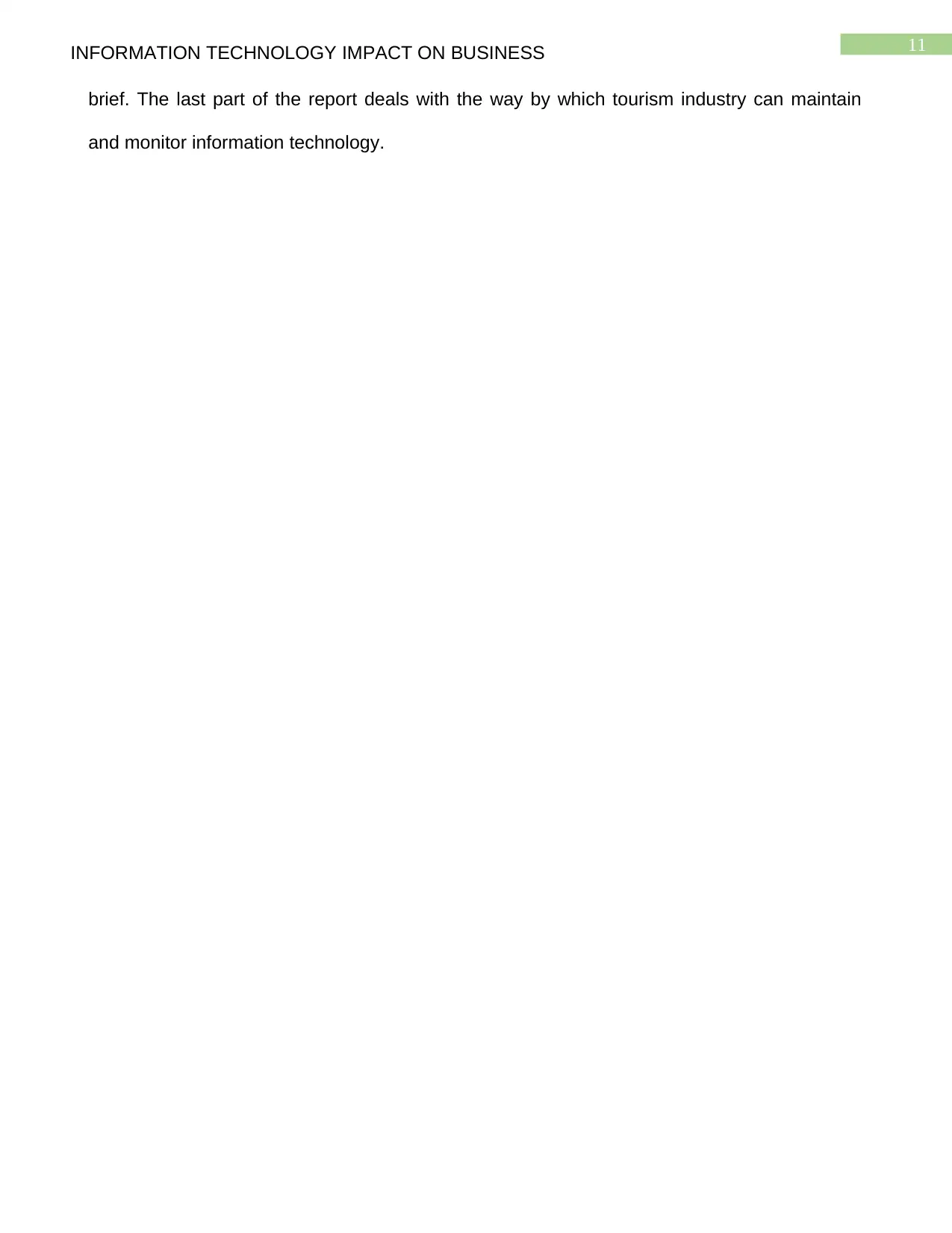
11INFORMATION TECHNOLOGY IMPACT ON BUSINESS
brief. The last part of the report deals with the way by which tourism industry can maintain
and monitor information technology.
brief. The last part of the report deals with the way by which tourism industry can maintain
and monitor information technology.
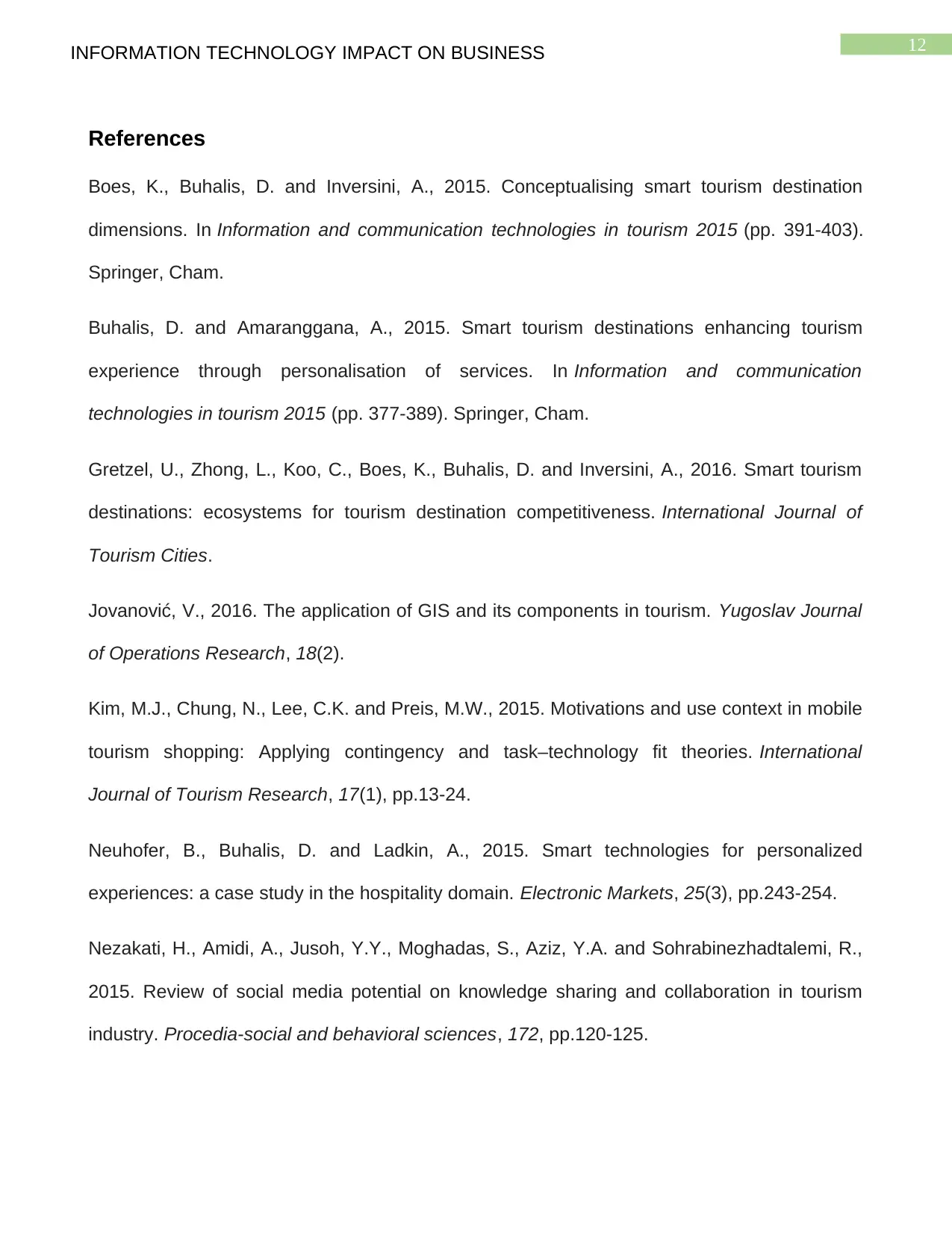
12INFORMATION TECHNOLOGY IMPACT ON BUSINESS
References
Boes, K., Buhalis, D. and Inversini, A., 2015. Conceptualising smart tourism destination
dimensions. In Information and communication technologies in tourism 2015 (pp. 391-403).
Springer, Cham.
Buhalis, D. and Amaranggana, A., 2015. Smart tourism destinations enhancing tourism
experience through personalisation of services. In Information and communication
technologies in tourism 2015 (pp. 377-389). Springer, Cham.
Gretzel, U., Zhong, L., Koo, C., Boes, K., Buhalis, D. and Inversini, A., 2016. Smart tourism
destinations: ecosystems for tourism destination competitiveness. International Journal of
Tourism Cities.
Jovanović, V., 2016. The application of GIS and its components in tourism. Yugoslav Journal
of Operations Research, 18(2).
Kim, M.J., Chung, N., Lee, C.K. and Preis, M.W., 2015. Motivations and use context in mobile
tourism shopping: Applying contingency and task–technology fit theories. International
Journal of Tourism Research, 17(1), pp.13-24.
Neuhofer, B., Buhalis, D. and Ladkin, A., 2015. Smart technologies for personalized
experiences: a case study in the hospitality domain. Electronic Markets, 25(3), pp.243-254.
Nezakati, H., Amidi, A., Jusoh, Y.Y., Moghadas, S., Aziz, Y.A. and Sohrabinezhadtalemi, R.,
2015. Review of social media potential on knowledge sharing and collaboration in tourism
industry. Procedia-social and behavioral sciences, 172, pp.120-125.
References
Boes, K., Buhalis, D. and Inversini, A., 2015. Conceptualising smart tourism destination
dimensions. In Information and communication technologies in tourism 2015 (pp. 391-403).
Springer, Cham.
Buhalis, D. and Amaranggana, A., 2015. Smart tourism destinations enhancing tourism
experience through personalisation of services. In Information and communication
technologies in tourism 2015 (pp. 377-389). Springer, Cham.
Gretzel, U., Zhong, L., Koo, C., Boes, K., Buhalis, D. and Inversini, A., 2016. Smart tourism
destinations: ecosystems for tourism destination competitiveness. International Journal of
Tourism Cities.
Jovanović, V., 2016. The application of GIS and its components in tourism. Yugoslav Journal
of Operations Research, 18(2).
Kim, M.J., Chung, N., Lee, C.K. and Preis, M.W., 2015. Motivations and use context in mobile
tourism shopping: Applying contingency and task–technology fit theories. International
Journal of Tourism Research, 17(1), pp.13-24.
Neuhofer, B., Buhalis, D. and Ladkin, A., 2015. Smart technologies for personalized
experiences: a case study in the hospitality domain. Electronic Markets, 25(3), pp.243-254.
Nezakati, H., Amidi, A., Jusoh, Y.Y., Moghadas, S., Aziz, Y.A. and Sohrabinezhadtalemi, R.,
2015. Review of social media potential on knowledge sharing and collaboration in tourism
industry. Procedia-social and behavioral sciences, 172, pp.120-125.
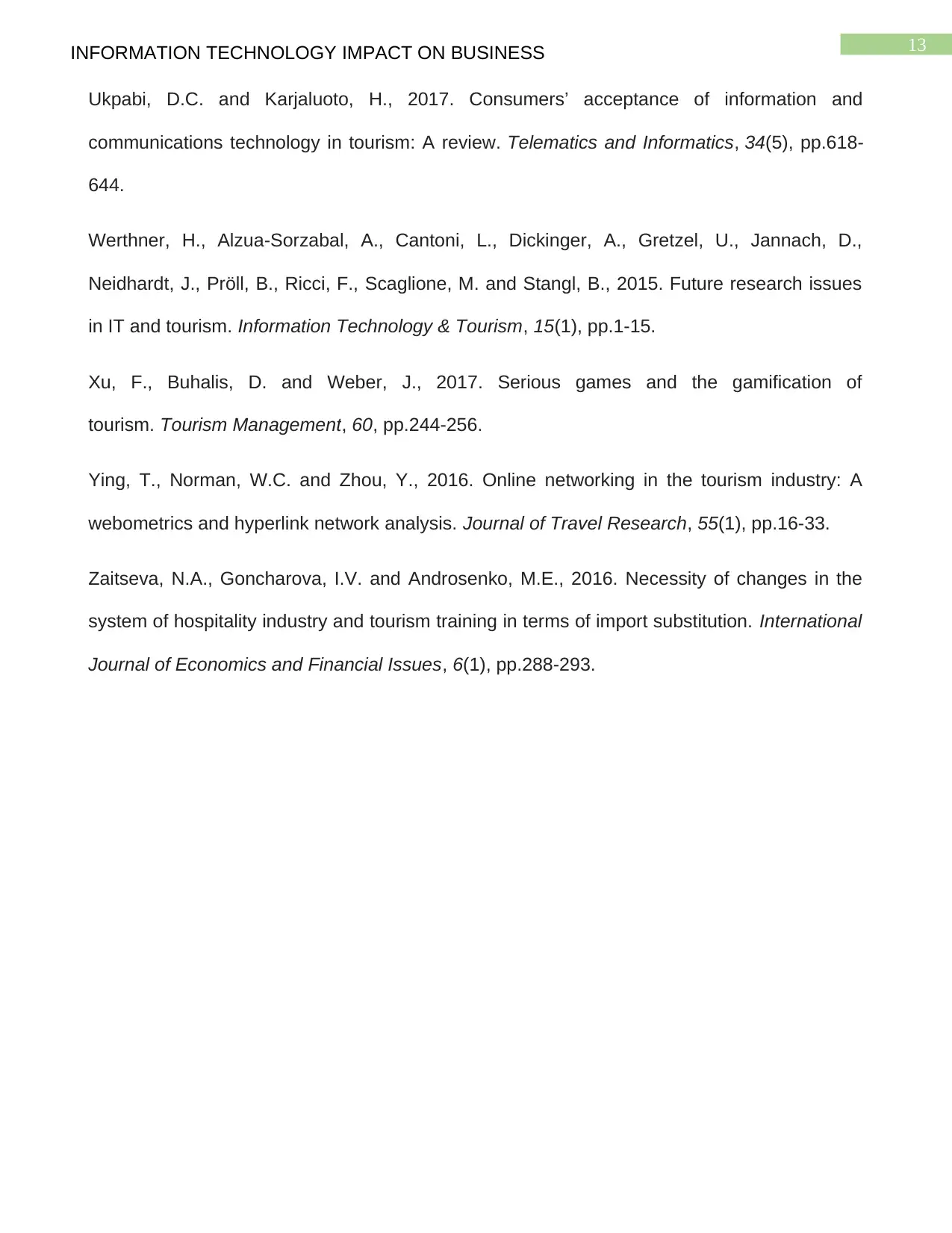
13INFORMATION TECHNOLOGY IMPACT ON BUSINESS
Ukpabi, D.C. and Karjaluoto, H., 2017. Consumers’ acceptance of information and
communications technology in tourism: A review. Telematics and Informatics, 34(5), pp.618-
644.
Werthner, H., Alzua-Sorzabal, A., Cantoni, L., Dickinger, A., Gretzel, U., Jannach, D.,
Neidhardt, J., Pröll, B., Ricci, F., Scaglione, M. and Stangl, B., 2015. Future research issues
in IT and tourism. Information Technology & Tourism, 15(1), pp.1-15.
Xu, F., Buhalis, D. and Weber, J., 2017. Serious games and the gamification of
tourism. Tourism Management, 60, pp.244-256.
Ying, T., Norman, W.C. and Zhou, Y., 2016. Online networking in the tourism industry: A
webometrics and hyperlink network analysis. Journal of Travel Research, 55(1), pp.16-33.
Zaitseva, N.A., Goncharova, I.V. and Androsenko, M.E., 2016. Necessity of changes in the
system of hospitality industry and tourism training in terms of import substitution. International
Journal of Economics and Financial Issues, 6(1), pp.288-293.
Ukpabi, D.C. and Karjaluoto, H., 2017. Consumers’ acceptance of information and
communications technology in tourism: A review. Telematics and Informatics, 34(5), pp.618-
644.
Werthner, H., Alzua-Sorzabal, A., Cantoni, L., Dickinger, A., Gretzel, U., Jannach, D.,
Neidhardt, J., Pröll, B., Ricci, F., Scaglione, M. and Stangl, B., 2015. Future research issues
in IT and tourism. Information Technology & Tourism, 15(1), pp.1-15.
Xu, F., Buhalis, D. and Weber, J., 2017. Serious games and the gamification of
tourism. Tourism Management, 60, pp.244-256.
Ying, T., Norman, W.C. and Zhou, Y., 2016. Online networking in the tourism industry: A
webometrics and hyperlink network analysis. Journal of Travel Research, 55(1), pp.16-33.
Zaitseva, N.A., Goncharova, I.V. and Androsenko, M.E., 2016. Necessity of changes in the
system of hospitality industry and tourism training in terms of import substitution. International
Journal of Economics and Financial Issues, 6(1), pp.288-293.
1 out of 13
Related Documents
Your All-in-One AI-Powered Toolkit for Academic Success.
+13062052269
info@desklib.com
Available 24*7 on WhatsApp / Email
![[object Object]](/_next/static/media/star-bottom.7253800d.svg)
Unlock your academic potential
© 2024 | Zucol Services PVT LTD | All rights reserved.



